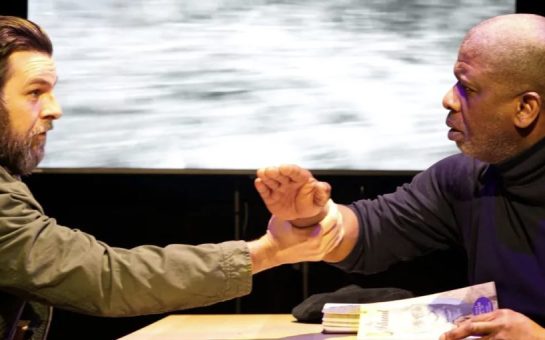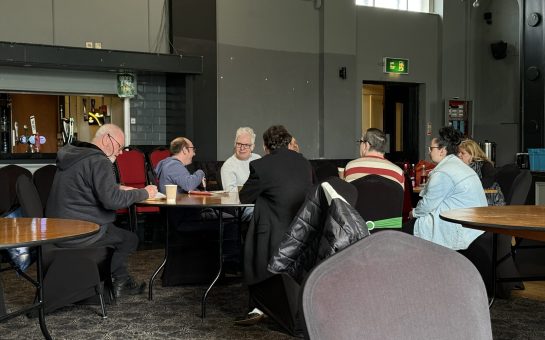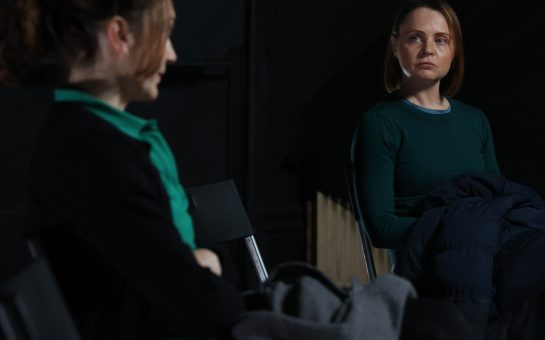“I’ve got a new stadium,” artistic director Jenny Sealey tells MM with her new production in town.
And using an arena to challenge stereotypes is what Sealey (above left) does best.
This time round for Sealey it’s The House of Bernarda Alba which she has her eyes focused on, bringing Spanish playwright Federico Garcia Lorca’s 1936 masterpiece to Manchester’s unique Royal Exchange Theatre from February 3-25.
Five years ago she co-directed the London 2012 Paralympic Games’ opening ceremony, the spectacle boldly asking the athletes and 80,000 strong audience to “look to the stars”.
Nottingham-born Sealey, who became Deaf aged seven, has used Lorca’s play – in collaboration with the UK’s flagship disabled-led theatre company Graeae – to change people’s perceptions of what disabled people are capable of.
“I feel here at Manchester Royal Exchange I’ve got a new stadium, a bit smaller than in the London Stadium, but a little, tiny stadium of 750 people.
“The same objective is true – to challenge people’s perceptions of what is possible.”
Some comparisons can also be made between the story told in the play and the realities of life for so many people.
The play opens up the concept of challenging one’s perception about the world around them and also to stand up against an overbearing authoritative figure – no doubt influenced by Lorca’s life.
Considered one of Spain’s greatest poets and dramatists, Lorca was given international recognition for his poetry and plays, including Songs (1927) and the Gypsy Ballads (1928), Blood Wedding (1933) and of course The House of Bernarda Alba (1936).
However when the Spanish Civil War broke out soon afterwards Lorca was executed in Granada by General Franco’s Nationalist forces, after the 38-year-old found himself caught up in the middle of the conflict because of his outspoken socialist views and also the fact that he was deemed a homosexual.
“We all have the right to a narrative and we all laugh and we are all someone’s son, someone’s daughter and in the case of Bernarda Alba we are all someone’s daughter,” said Sealey.
“So everything we do is about challenging rights, human rights, to do and fulfil our potential as human beings.”
Sealey’s production of The House of Bernarda Alba is special because of the theatre company’s attempt to re-define the play by having an all-female cast and having Deaf and disabled people play the parts.
“What’s brilliant about companies like Graeae and brilliant about Manchester Royal Exchange is finding collaboration so we can have the theatre here full of Deaf and disabled women doing Lorca.
“Many years ago someone said to me Lorca did not write Blood Wedding for people like you to be in it.
“That’s like a red rag to a bull and I said ‘No, Lorca wrote plays for people to be in it, just as Shakespeare wrote plays for people’.”
Rehearsals are equally challenging because of the pressure to put on a strong performance of a play which dramatists are well versed too.
“Every new production informs you and challenges, which brings me to Bernarda.
“I have 10 people in a rehearsal room, all who have an opinion, so I’ve been sorely and beautifully tested.
“There are critics out there, there are peers that are evaluating you, judging you, watching your next move, especially after 2012. They’re asking ‘what is she going to do next?’
In 2009 Sealey was awarded an MBE for her work within the disabled arts, later working in collaboration with choreographer Mark Smith and Bradley Hemmings to stage the memorable 2012 ceremony.
“Bradley and I don’t do nice, we do story, we do politics, we do narrative. So for the Paralympics we took on “The Declaration of Human Rights”, that was our narrative.
“When we took on our presentation to the government, I think they were in shock, it was not what they were expecting and I think that was the same reaction for the ceremony’s team: ‘oh right – this is theatre’.
“All of our stories were interlinked, by sheer coincidence, to the Tempest. It was quite interesting matching expectation, or lack of expectation, and saying ‘excuse me, we are not going to dumb down [the performance] in any shape or form’.
“I think the perception of the Paralympics has changed. I think even in Brazil the Paralympics was like ‘Wow! Bring it on’.
“So yes, our Paralympians were extraordinary in 2012, I mean they raised that bar and I don’t think we’ll ever look back from that.”
Since 2012 Sealey has kept her toes in the Paralympics politics. She went to visit last year’s Paralympic Games in Brazil and before that visited Japan to discuss how the Paralympic Games will operate for Tokyo 2020.
“I have been to Japan already, talking to Tokyo 2020, thinking about accessibility, creative accessibility. I am pushing the agenda to the disabled artists.
“We really did make the whole thing [London 2012 Ceremony] about Deaf and disabled people, made them centre stage, and I want Japan to.
“I also think they [Japan] will do so because they really started to embrace those sensibilities at the handover. So I remain hopeful.”



